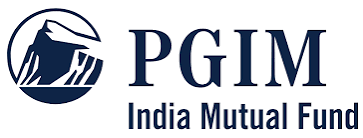PGIM India Hybrid Equity Fund: Power of 3 asset classes

Asset allocation is one of the most important aspects of investing. Asset allocation balances risk and return with the objective of producing expected returns with optimal risk. Hybrid Aggressive Funds invest 65 - 80% of their assets in equity or equity related securities and 20 - 35% in debt and money market instruments. Since the equity allocation is on the higher side, these funds have the potential of generating inflation beating returns over long investment horizon; at the same time, the debt component of the fund reduces downside risks in volatile markets. Another advantage of aggressive hybrid funds from the investor’s perspective is automatic asset allocation rebalancing.
About PGIM India Hybrid Equity Fund
The unique feature of this fund that sets it apart from its peers is that it offers the asset allocation benefits of three asset classes, Domestic Equity, Domestic Debt and International Equity. The minimum domestic equity allocation of this fund will be 65% and hence the fund will enjoy equity taxation benefits.
Benefits of the asset allocation strategy of PGIM India Hybrid Equity Fund
- Low correlation of returns between asset classes (see the chart below). Diversifying across asset classes will provide stability across different market conditions.
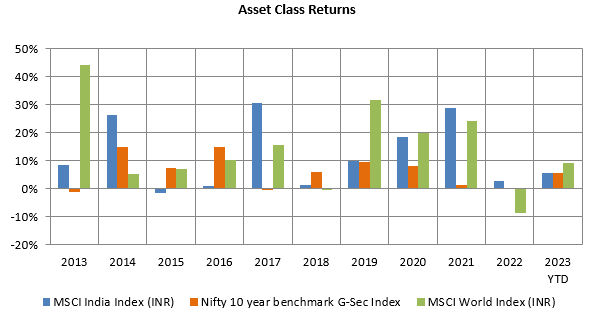
Source: MSCI, NSE, Yahoo Finance, as on 31st October 2023. Disclaimer: Past performance may or may not be sustained in the future
- Expected lower portfolio volatility
- Potentially superior performance across market cycles.
Asset Allocation of PGIM India Hybrid Equity Fund
PGIM India Hybrid equity has maintained domestic equity allocation at around 65 – 70%, while debt and international allocations have been around 20% and 10% respectively (see the chart below). For international equity exposure PGIM India Hybrid Equity Fund invests in its international fund PGIM Jennison Global Equity Opportunities Fund. We will discuss the international component in greater details later in this article.
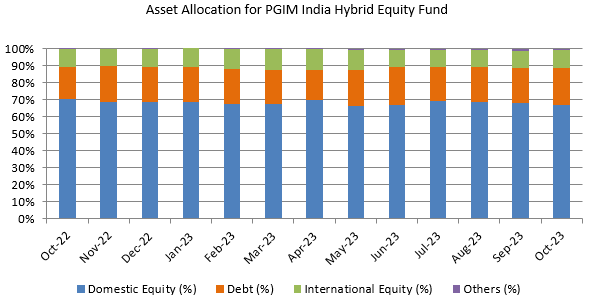
Source: PGIM India MF, as on 31st October 2023.
Domestic equity - PGIM India Hybrid Equity Fund
For the domestic equity allocation, the fund maintains a large cap tilt with 70 – 75% allocation to large cap and the rest in mid and small caps (see the chart below). The average large cap allocation in the last 12 months was 73%, while the average mid and small cap allocations were 16% and 11% respectively. The large cap allocation can provide stability to the portfolio, while midcap and small allocations can generate potential alpha over long investment horizon.
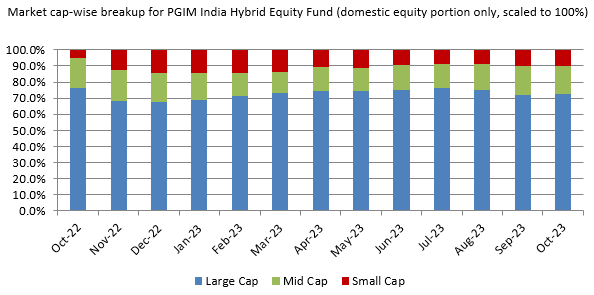
Source: PGIM India MF, as on 31st October 2023.
The fund looks to invest in companies which are growing faster than the industry segments in which they operate (market share gainers), and higher growth and higher quality companies with consistently higher Return on Equity (steady compounders).

Source: PGIM India MF, as on 31st October 2023.
Domestic Debt
The approach for the debt allocation is to run a quality portfolio to provide stable returns with low volatility. Currently, the debt portfolio seeks to maintain average maturity of short to medium term. The average maturity of the current portfolio (as on 31st October 2023) is 1.16 years and the yield to maturity (YTM) is 7.42% (source: Advisorkhoj Research, as on 31st October 2023). The credit quality of the portfolio is very high as around 90% of the debt portfolio comprises of Government Bonds (G-Secs) and State Development Loans (SDLs), while the balance 10% are AAA rated papers (source: PGIM MF, as on 31st October 2023).
International Equity
PGIM Jennison Global Equity Opportunities Fund takes an opportunistic, global approach to growth investing by searching for companies believed to be new market leaders with sustainable competitive advantages and strong financial characteristics. The fund looks to invest in companies that have above average growth rates fuelled by disruptive, innovative products and services with large addressable markets. The Fund is comprised of 35 – 45 stocks that undergo rigorous bottom-up, fundamental analysis resulting in a high conviction, high active share portfolio.
PGIM Jennison Global Equity Opportunities Fund is invested in disruptors of tomorrow led by Technology and Consumer Discretionary (see the table below). PGIM Jennison Global Equity Opportunities Fund has outperformed its benchmark index MSCI World ACWI since its inception in 2012 (source: PGIM Investments, as on 30th September 2023).
Key investment themes for PGIM Jennison Global Equity Opportunities Fund.
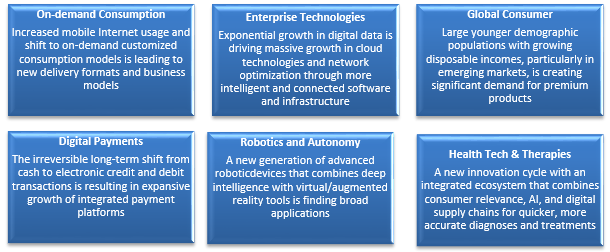
Source: PGIM India MF, as on 31st October 2023.
Outperformed Nifty 50 in last 1 year
PGIM India Hybrid Equity Fund has outperformed the Nifty 50 TRI in the last 1 year ending 31st October 2023 (see the chart below). In the last 1 year, the biggest correction (drawdown) of Nifty 50 TRI was -10%, while that of PGIM India Hybrid Equity Fund was only -5%. Thus on a risk-adjusted basis, the hybrid equity is a viable option compared to pure large cap fund for slightly conservative investors.
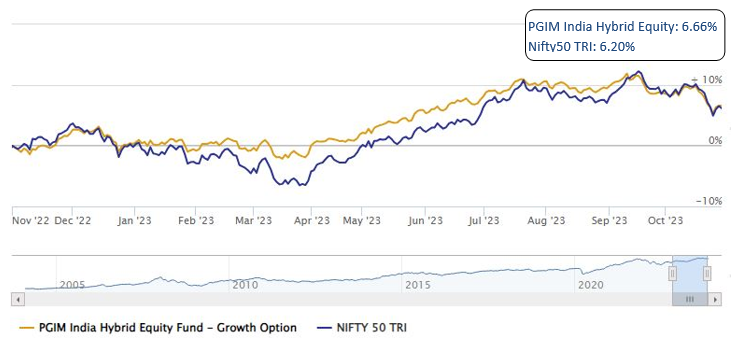
Source: Advisorkhoj Research, as on 31st October 2023.
Why invest in PGIM India Hybrid Equity Fund?
- Participate in the equity upside along with an allocation to debt instruments, potentially providing stability in volatile markets.
- Get exposure to international equities through the PGIM Jennison Global Equity Opportunities Fund
- Get benefits of equity taxation
Who should invest in PGIM India Hybrid Equity Fund?
- Investors looking for capital appreciation and income over long investment horizons
- Investors with minimum 3 – 5 years investment tenure
- You can invest either in lump sum or SIP based on your investment needs
Investors should consult their financial advisors or mutual fund distributors if PGIM India Hybrid Equity Fund is suitable for their investment needs.
Mutual Fund Investments are subject to market risk, read all scheme related documents carefully.
PGIM is the global investment management business of Prudential Financial, Inc. (PFI) USA, with USD 1.5 trillion1 in assets under management. We offer a broad range of investment capabilities through our multi-manager model along with experienced investment teams that assist you in achieving your financial goals. With a glorious legacy of 145 years, PGIM is built on the strength, stability and deep expertise in managing money. We offer you a long-term perspective, having weathered multiple market cycles, and see opportunity in periods of disruption.
Investor Centre
Follow PGIM India MF
More About PGIM India MF
POST A QUERY


